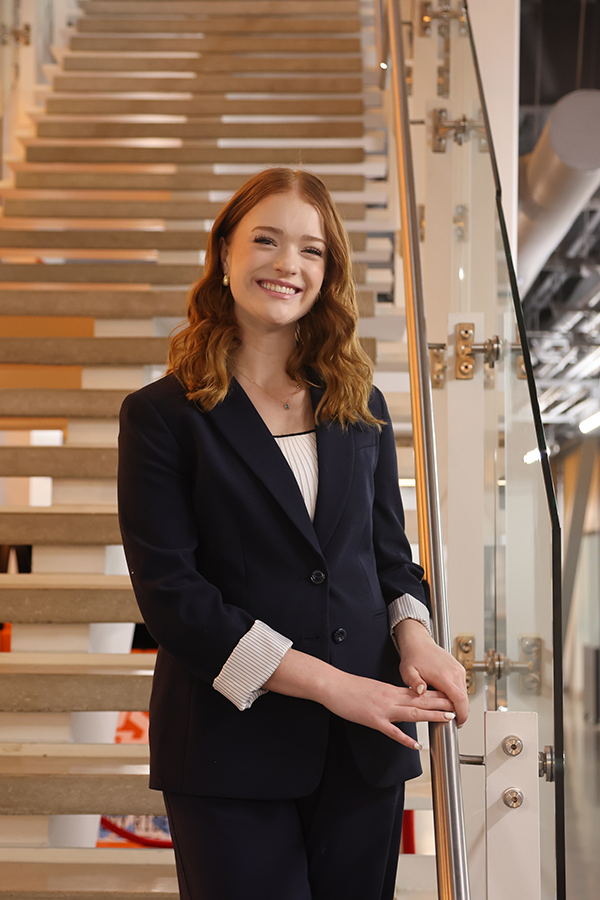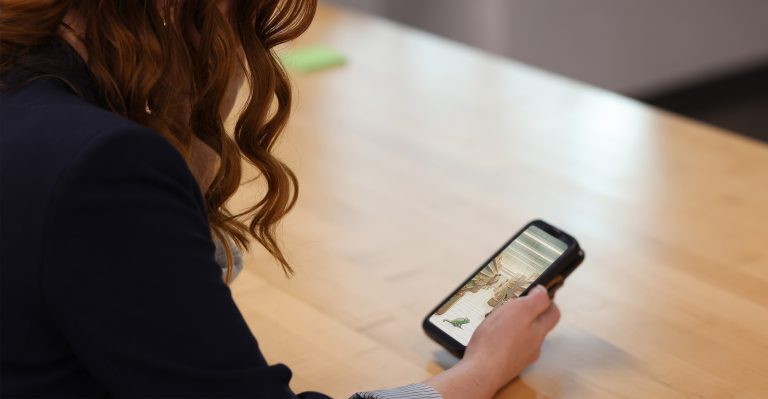Wednesday January 22, 2025
Media Contact: Tanner Holubar | Communications Specialist | 405-744-2065 | tanner.holubar@okstate.edu
Aubrey Fudge is passionate about helping to close the gaps in education, particularly in language learning.
After living in high school for a year and a half in Germany, she realized that the most effective way to learn a language was to immerse yourself in it. Now, as a student at College of Engineering, Architecture and Technologyshe is developing a way for people to immerse themselves in language learning.
Fudge, specialized in mechatronics and robotics in the Engineering Technology Division was born and raised in Oklahoma City. But it was during her time in Europe that she developed the idea for Lingua, a language learning platform designed to overcome the shortcomings of traditional language teaching.
In many cases, especially in the United States, language teaching involves memorization and repetitive exercises. Lingua combines artificial intelligence and virtual reality to create an immersive, hands-on environment in which users are placed in real-world scenarios where they can practice a new language.
“After living abroad, I realized that immersion was the most effective way to actually learn a language – something I had not experienced through traditional methods like high school or college. language applications,” she said. “In Europe, multilingualism is common, but in the United States many people remain monolingual despite years of language study. This sparked my passion to create Lingua, an innovative platform that aims to strengthen language education in the United States and make it more accessible and impactful.
Fudge said its dynamic approach can boost skill acquisition, improve engagement and improve retention by up to 60%; thus making learning faster, more efficient and more fun. She believes this has the potential to reshape language teaching across the country, where proficiency in secondary languages lags behind other countries.

“Perhaps most importantly, Lingua can help close the educational and economic gaps between private, public and homeschool students by providing equitable access to immersive language tools,” Fudge said. “Offering low-cost or subsidized versions of Lingua would help low-income families and underserved communities give students a more equitable chance to succeed in higher education and obtain competitive jobs.” »
She worked alongside Harrison Confer, a finance and accounting student at the Spears School of Business, with Fudge managing software development and Confer leading investor initiatives and bringing together interested groups for beta testing. The goal is to get Lingua off the ground and into schools for beta testing once it has passed the initial stages of development.
Lingua is designed as an immersive adventure-style game in which users complete tasks to advance. It features a chameleon that follows the user as a companion and changes color as they progress.
Users interact with AI-based non-playable characters tailored to their language skills, enabling real-world conversations.
“This combination of engaging gameplay and adaptive conversation practice makes learning both fun and effective,” Fudge said.
Rewarding entrepreneurship
OSU’s Riata Center for Innovation and Entrepreneurship promotes experiential learning and offers competitions for students to pitch their business ideas.
Fudge entered the Riata Presentation and Poster Competition in November, winning first place in the High Tech category and receiving a $1,000 scholarship.
It was a new and enjoyable experience for Fudge which also resulted in him being a finalist in the 2025 business proposal competition organized by the Riata Centre.
“I received helpful feedback on my idea and plan as well as my public speaking experience,” she said. “I am excited to participate in similar competitions in 2025.”
After graduation, she plans to focus on Lingua or pursue a career in industry, such as working for a space research company or a company in the robotics sector.
Fudge credits Dr. Joe Conner, Adjunct Assistant Professor at MFA and Matric Professor at ENDEAVOR, as an influence on his growth as an engineer. Conner is also an advisor to CEAT SOLVERS, in which Fudge is heavily involved.CEAT SOLVERS provides students with opportunities to participate in research, present research, and network.
“I hope to continue learning with him this next semester on the BB-8 interactive touring droid project for CEAT,” Fudge said. “On the student side, my fellow officers and members of CEAT SOLVERS have been a great source of inspiration. I truly consider each of them a mentor. Specifically, Tyler Graham, Charles Bruce, Toby Mears, and Andrew Fawcett taught me the importance of lifelong learning and constantly striving for greatness, regardless of the niche of the subject.
She said a major aspect of her success was having a strong support network and being surrounded by others who challenged her. Being able to collaborate with others kept her motivated and helped her learn that it’s okay to ask for help, especially when balancing a difficult major and getting involved in many different things.
“It’s hard, but it’s possible with the right mindset,” Fudge said. “The key is to prioritize and recognize that balance does not mean giving equal time to everything. Set clear, meaningful goals, whether academic or personal, and make decisions that align with your larger vision.
“For me, focusing on how I could use my skills to make an impact helped me stay grounded when things got hectic. Once you know your “why,” it’s easier to manage stress and make time for what matters.
Fudge is looking to expand his team, either through the help of students or professors. Anyone interested in being part of his team can email him at aubrey.fudge@okstate.edu.


